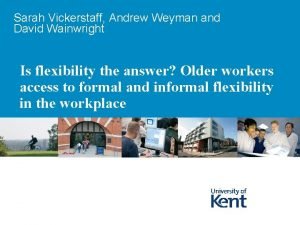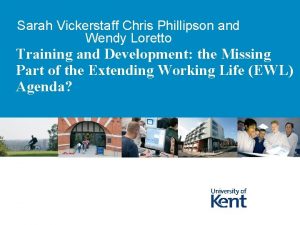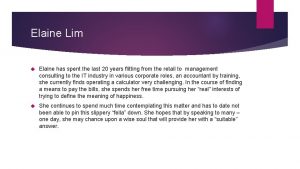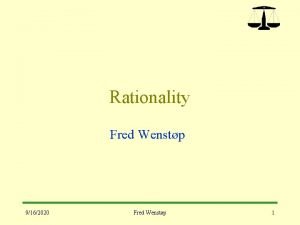Sarah Vickerstaff and Elaine Alden Good old Fred





















- Slides: 21

Sarah Vickerstaff and Elaine Alden “Good old Fred”: Formality and informality in the management and retention of older employees.

Policy developments and the organisational level • The last decade has seen unprecedented policy reform and • • • Page 2 development across a number of spheres which impacts upon extending working lives issues: Equalities legislation; no default retirement age; right to request flexible employment. Whilst establishing rights is a major step forward there is the risk that organisations will enact policies that assume all older workers need or want the same opportunities, missing the heterogeneous nature of older workers’ situations. In addition informal solutions to constraints on work caused by health issues, caring responsibilities or the desire to retire gradually allow the older worker and the organisation to find solutions that aid retention. The problem with such informality is its dependence upon current relationships, if line management changes ‘ad hoc’ agreements may not be honoured.

Flexible work options • • Focus on the negotiation of flexible work options. An area of HRM hypothesized as important for older workers (OECD, 2006; Moen and Sweet, 2004; Loretto et al, 2007; Pitt-Catsouphes and Matz-Costa, 2008). • We readily acknowledge that flexibility is not always positive (Brooke et al, 2013; Loretto and Vickerstaff, 2015). Page 3

Objectives of the paper • • Page 4 To examine older workers experience of current organisational practices around flexible work options with a focus on informal as well as formal measures. To consider the implications of the interplay between formal and informal practice.

Qualitative data sets (1): Flex study • • • Page 5 The first is composed of interview data collected in the summer of 2010 from a stratified random sample of 50 employees aged 50+ living in the South East of England. The sample was a mixture of employed (n. 30), self-employed (n. 8) and not working (n. 12) seniors and explored their experiences of working flexibly or seeking flexible work. The sample was 52% female and the age range for the sample as a whole was 50 -74.

Qualitative data sets (2): Transport • • Page 6 Ongoing research involving organisational case studies looking at how extended working life is being negotiated within the workplace. This paper uses data from one of these case studies: Transport (a private train operator). 33 people have been interviewed for the transport case of which: 6 are HR managers; 6 are line managers; 19 are employees and 2 are representatives of national trade unions in the sector. Of those individually interviewed 45% were female; the ages of employee respondents ranged from 49 -69 years of age. In addition to these individual interviews a focus group was held at the outset involving 5 HR and Occupational Health managers from a number of different train operating companies.

Reasons for seeking flexibility Reasons respondents flexibility gave for seeking Numbers giving the reason* Bridge/transition to retirement 18 Care commitments 15 Health issues. Disability 8 Employer flex-Time system 5 Other interests 2 Preferred way of working 2 * Respondents could state more than one reason Source: Flex study (Alden, 2012) Page 7

Access to flexible work in flex study • • Page 8 Older workers were able to access flexible work options through various means: official flexible working policies which were clearly defined; informal negotiated agreements; seeking work in particular environments or work in industries which would allow flexibility; or self-directed employment which could be paid or voluntary work. Official flexible working policies were most prevalent in large public and private employers and included hot-desking, home working, flexitime, core hours flexi- time, weekly hours contracts, job sharing, part-time working, shift work, and flexi-retirement.

Informal flexibility • Informally negotiated access to flexibility was more likely to be offered in small to medium organisations, and as a rule these were only accessible to existing ‘trusted’ employees, not ‘unknown’ applicants seeking work. It’s just an agreement [to work remotely] I have with my line manager. He expects. . . It’s on trust. I’m an adult. He expects me to behave in a responsible manner, do the job, reach my targets and objectives. If I’m falling short of my targets and objectives and I keep turning up in fishing gear with a fishing rod under my arm he’s going to suspect. But providing I’m at the end of a phone or I’m answering peoples e-mails if they’ve got any requirements for support they know I’m not letting them down. There’s no problem. There’s no issue at all. There never has been. (Male, 54, Working, Medium Private Employee, Flex study) Page 9

Conditions for informal flexibility • • • Page 10 Puts a premium on line managers willingness and ability to manage creatively. Line managers have to have a degree of decision latitude: puts an emphasis on the relationship between HR and line managers. . Privileges ‘insiders’, long-serving employees. Emphasis on older workers’ willingness to ask for flexibility. Good communication channels. Needs co-worker buy-in.

Flexibility in transport • • Transport traditionally was a male dominated industry and to some extent still is, especially the group of train drivers. There was little scope for part-time work amongst the operational staff: train drivers, conductors and train despatchers. An HR manager for part of the company’s regional area commented: And particularly I find with shift work, our older employees find shift work very difficult, the getting up at four in the morning, they really do struggle. (Female, HR Manager, Transport). Page 11

The urge for flexibility: from above • • The HR function in Transport wants to extend opportunities for more flexible work as a way to potentially diversify the pool of applicants for jobs and generally meet prevailing expectations for contemporary employment conditions. Greater access to flexible work options however is seen as difficult in this industry. The line managers who are responsible for managing the train operations and the complex rostering arrangements that prevail have little appetite for greater formal flexibility: It’s not that well received [part-time working] by the company to be honest because it’s a pain in the bum to organise, it is…. It’s a very difficult thing to sort out in this industry, you know, it’s different if you worked in a sweet shop or something I suppose because you would just do earlies, lates or whatever you would do and that’s how it would work (Male Operations Inspector, Transport). Page 12

The urge for flexibility: from above • Page 13 HR allows job shares, if two employees in the same function can agree they can request to split a job two weeks on and two weeks off. There are examples of people working this pattern but it is easier for conductors or station staff to arrange than drivers and there are limits to the numbers in a particular depot that can work this pattern. A number of employees expressed an interest in these arrangements especially as a way of winding down but were realistic about the chances of being able to do it.

The urge for flexibility: from below I mean one thing that has cropped up a few times and it has been a difficulty on the railway, this is where that [orgname] don’t get to score high marks is that people like the idea of job sharing, and working 50 per cent, or getting to the age when they might want to stop working and instead of just stopping dead slow down, work 50 per cent of the time. Q: Yes, so kind of phase in if you like? A: Work two weeks on two weeks off or something like that and job share with somebody, then they’re not very good on that [orgname], they’re not very accommodating on that and I said that as a nice option to take possibly, when you’re ready for it, just work half the time and get--, gradually ease into retirement, you know what I mean, just going bang stop. (Male Train Driver, Transport) Page 14

Flexibility still exists within transport • On the trains there were many examples of work teams dealing with the issues around shift patterns by individuals swapping shifts: I mean I'm the wrong one to talk to [about shifts] actually because I don’t do the full range of shifts. I have an arrangement with a chap that I do his earlies, he works my late turns. So I don’t do the full range of earlies and lates, I just do early turns…. And the other chap it suits him for his childminding, etcetera, it's easier for him to do the late turn so that he's at home in the morning. Yeah. Q: So in terms of who organises your shift patterns is that done by the train manager or? A: Yeah it's down to management, but we always do it ourselves here. (Male Conductor, Transport). There were examples in both data sets of flexibility arranged within the work group. Page 15

Formality and informality around redeployment • In Transport there are well-developed policies for redeployment in the case of health or medical issues, in particular drivers who were medically restricted from driving could return to platform roles or ticket office work, with pay and pension protections. This co-existed alongside more informal arrangements: it’s oh good old Fred, he’s, you know, he’s been a driver for 40 years, you can’t do anything like that to him, and they have a real reluctance and I think it’s cultural within Transport, the reluctance to deal with capability of older drivers…. With redeployment, ‘cause we are at a huge, or so many safety critical jobs where they just can’t do say jobs with some of the people, for whatever reason, I think managers are, yeah, good old Fred again are hiding people in roles instead of actually addressing the situation. And that’s sort of, especially among drivers. (Transport HR manager in a focus group of HR managers from different train operating companies). Page 16

Discussion (1) • • • Page 17 The findings suggest that line managers are pivotal in the successful management of older workers but that organisations differ in the decision latitude they give line managers and line managers have differing levels of skill and appetite for creative management of seniors. Informal arrangements for a particular older worker often work well but may be selectively offered within a work group or to some occupational groups rather others. Long serving employees seemed the most likely to be able to negotiate flexibilities that may not be available to other workers or recent recruits and this is worth testing in further research.

Discussion (2) • • • Page 18 The data also demonstrated that negotiating flexibility informally is a complex phenomenon involving not just interactions between employees and line managers but also between employees. Solidarity among employees and respect from line managers were features of successfully negotiated individual arrangements. This offers a more multifaceted picture than that suggested by many accounts of access to flexibility for seniors. It is also clear in that in our examples there are tensions and accommodations between HR policy and what is happening on the ground. This supports other research which suggests that line managers are key in the successful implementation of policy or interventions for seniors.

‘Good old Fred’ positive or negative? • • • ‘Good old Fred’ is by definition someone well known and well thought of and this had a negative side for older workers seeking work who could not benefit from being in the ‘trusted’ category but the idea of ‘good old Fred’ may also carry with it an apparently benign but nevertheless stereotypical vision of the older worker as someone with decreasing capability and/or productivity. This confirms the findings of other case study work that access to flexibility and redeployment can play into age-based assumptions about suitable and unsuitable roles for older workers (Brooke et. al. 2012). The readiness formally and informally to redeploy older workers in Transport though positively received by the employees themselves fed into a narrative of slow decline related to age, which meant all older workers were potential targets for stereotypical attitudes and indeed some of the seniors Page 19 themselves bought into this image.

Limitations of the study and future research • • • It is obviously not possible to generalise on the basis of two qualitative data sets. Flex study was conducted prior to the recent extension of the right to request flexible work to all workers, and although this policy change is very new and only just impacting upon practice in organisations one might still expect some greater awareness of flexibility issues now. The Transport case study shines a spotlight on a very particular and possibly atypical work setting. Page 20

Future research • • • Formal policies and legislation ensure an open door for employees to request and negotiate terms; however for both formal and informal policy success or failure rests largely on the skills, abilities and trustworthiness of the line manager. Both studies suggests that we need a more complex understanding of how older workers may or may not be able to negotiate working conditions conducive to staying in employment. We need to look, in addition to formal policy, at the myriad of ways in which work routines are negotiated informally between managers and the managed and between employees, sometimes in direct contrast to prevailing HR policy. The studies discussed here open a window on the complexity of older worker retention and management. It suggests that if we are to understand current age-management practices and prospects for success we need a more fine-grained assessment of how managers and the managed act in the context of the challenges of ageing workforces. Page 21
 Elaine alden
Elaine alden Andrew vickerstaff
Andrew vickerstaff Don alden adams
Don alden adams Lyn alden dividend stocks
Lyn alden dividend stocks Steel window association
Steel window association Nhft physiotherapy
Nhft physiotherapy Glass roses analysis
Glass roses analysis Nicholas alden riggle
Nicholas alden riggle Rose alden biesen
Rose alden biesen Alden turbine
Alden turbine Good thoughts good words good actions
Good thoughts good words good actions Hi, good afternoon!
Hi, good afternoon! Good afternon animado
Good afternon animado You are good you are good when theres nothing good in me
You are good you are good when theres nothing good in me Como te llamas in spanish
Como te llamas in spanish 10 year old sarah stands on a skateboard
10 year old sarah stands on a skateboard 10 year old sarah stands on a skateboard
10 year old sarah stands on a skateboard Squid use jet propulsion for rapid escapes
Squid use jet propulsion for rapid escapes Once upon a time there lived a man
Once upon a time there lived a man Once upon a time there lived an old man and an old woman
Once upon a time there lived an old man and an old woman Elaine allegretti barking and dagenham
Elaine allegretti barking and dagenham The examination of sarah good
The examination of sarah good







































